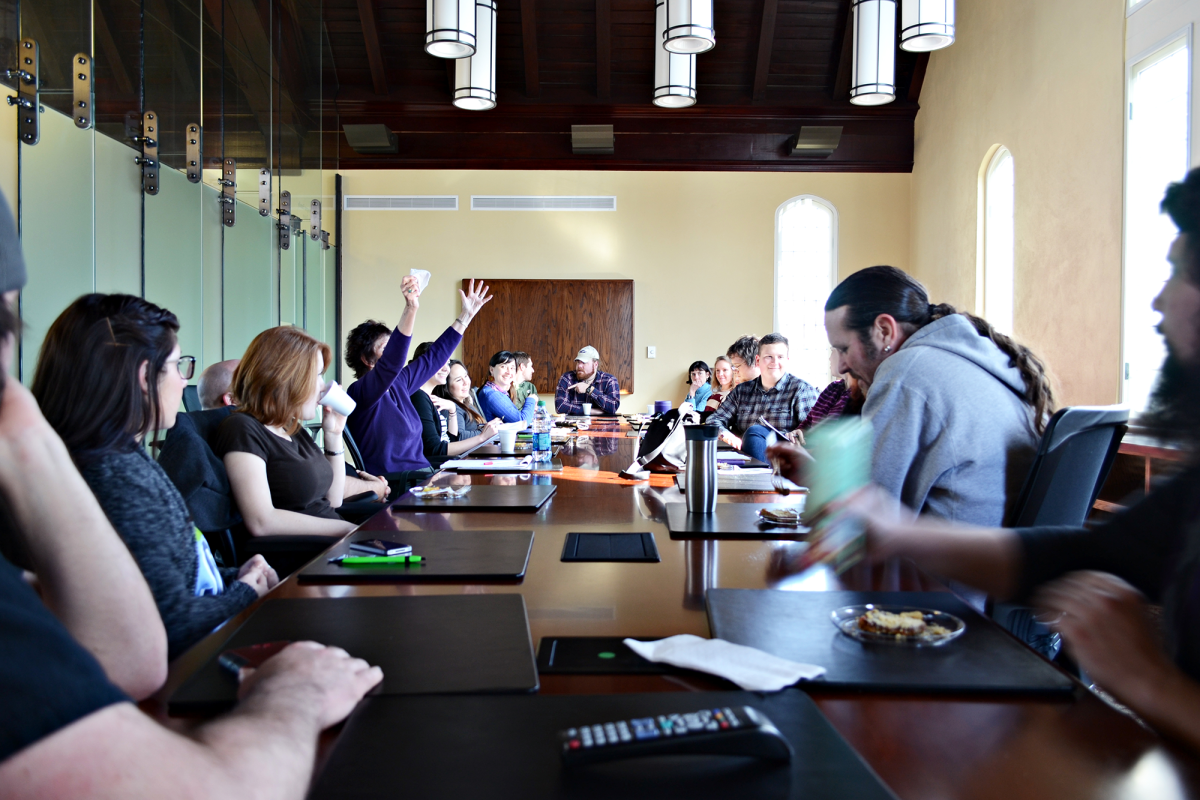As Darwin Week draws to a close, John Baumgardner, senior research associate of Logos Research in Santa Ana, Calif., and former Los Alamos national lab scientist, spoke Thursday in McCool Hall about his scientifically-supported beliefs that counter some aspects of Darwinism and present a different view of evolution, random mutation and fossil records.
The Society for the Advancement of Creation Science at Mississippi State University sponsored Baumgardner’s appearance, whose platform is titled, “Neo-Darwinism has been falsified by modern genetics — Why then is it still being taught?”
Born in 1809, British scientist Charles Darwin is the procreator and originator of the term “Darwinism,” a term used to describe his theory of evolution and the natural selection process. It is a sentiment that has been the basis for modern science that proposes scientific data explaining biological evolution.
Baumgardner discussed his arguments about evolution, natural selection and molecular complexity at Thursday’s lecture.
Baumgardner said Darwinism is obsolete and cannot account for the complexity seen at the molecular level in living organisms.
“Darwin had no inkling that life was so complex. I suspect that if he had known, he wouldn’t have ventured to make the kinds of claims he made,” Baumgardner said. “One thing I’ve done is tried to help everyone come up to speed and show some examples of molecular machinery that exists at the most basic levels of the cell.”
Baumgardner said he counters Darwin’s theory of evolution with scientific evidence that proves at least 300 generations would be sufficient in order to fix one mutation.
“There’s absolutely no way to transform a chimpanzee or some ancestor of a chimpanzee into a human in even six million years,” Baumgardner said. “We basically need the age of the Earth to make that transformation. This has been known by the specialist population geneticists for over 60 years, and they’ve kept it a trade secret of the high cost of selection. This is a fatal problem for evolution and for Neo-Darwinists.”
According to Baumgardner, molecular complexity, DNA and even language are entities that are too unique to specific individuals and too complex to have evolved.
“With what we know now, there is no other rational explanation than that God near instantaneously and supernaturally created all these living beings,” Baumgardner said. “As a scientist, I defy anyone to give any other alternative. Those systems are so complex that they can’t be put together simply, so it’s all or nothing. They have to be essentially completely functional or else they are not viable.”
Brian Sorgenfrei, campus minister of Reformed University Fellowship at MSU, said he thinks the idea that science and Christianity conflict one another is a contradiction because God is the author of both.
“I don’t think Darwinism can explain everything,” Sorgenfrei said. “When you ask Darwinists to explain why things are here, that’s something I don’t think they can answer. I think it has its limits, and I try to teach students not to start with what evolution teaches, but to start with Jesus, and figure it out.”
Sorgenfrei said perceived contradictions between science and the Bible mean that someone is wrong in either his or her interpretation of science or the Bible.
“Some of the greatest scientists have been Christians,” Sorgenfrei said. “I’m not a scientist, but I do know that the claims of scientists seem to change over periods of time. The uncertainty of it is what makes one question. It takes a generation before scientists go back and decide to disagree with something. I stand with the Bible, which has stood for over 2,000 years.”
With the contrasting views of Neo-Darwinism and Christian scientific-supported views of evolution and science, Jon Williams, junior computer science major, said he believes Darwinism seems to be the most logical theory.
“What Darwin found is the most likely to have happened,” Williams said. “Things just don’t appear, so they have to had come from something.”
Williams said he is, however, open to hearing the scientific beliefs and facts that support the proof of God and counter the Neo-Darwinism beliefs.
“I would give it a chance and listen to it so that I can evaluate it,” Williams said.
Josh Winter, professor of physics and astronomy, said he believes all scientific evidence points toward evolution, and evidence is the best proof of truth.
“I feel people who don’t understand that believing in evolution as a scientific idea is not the same thing as not believing in God,” Winter said. “It’s important to understand that creationism is not a scientific idea. Science starts with evidence and then goes with the idea, so that would make creationism in the form of a science, a pseudoscience.”
According to Winter, scientists have not made any claims that Darwinism explains everything, but Darwin’s findings are the best explanation for everything we physically see.
“Creationism encourages people to stop looking for the answer to unknown questions,” Winter said. “It takes away the motivation for people to find out why something is. There are things that evolution hasn’t explained and probably never will, but it is the basis for modern biology which consists of human genome projects and cancer treatment projects.”
Categories:
Darwin Week sparks controversy
Lacretia Wimbley
•
February 14, 2014
0
Donate to The Reflector
Your donation will support the student journalists of Mississippi State University. Your contribution will allow us to purchase equipment and cover our annual website hosting costs.
More to Discover






